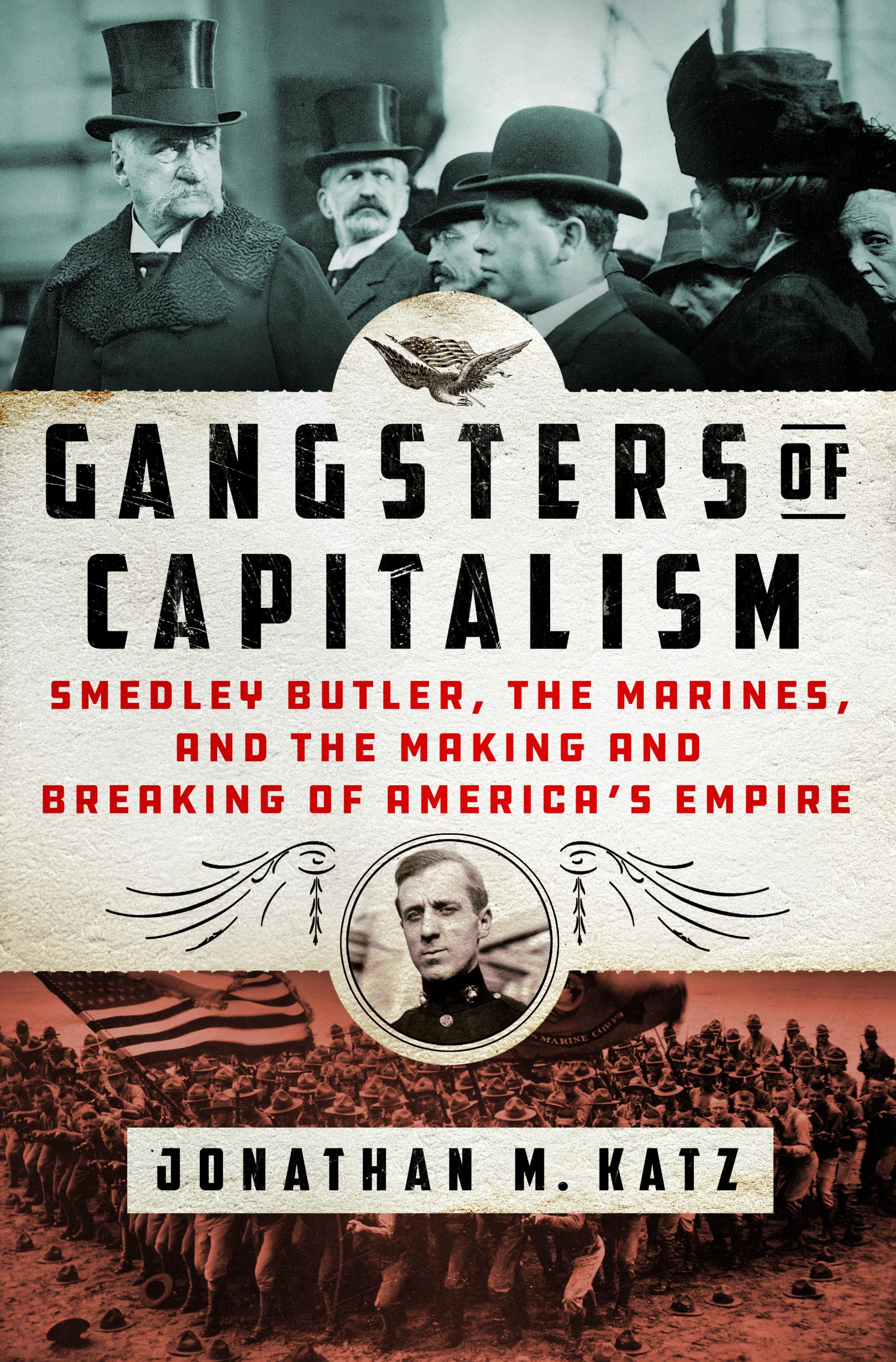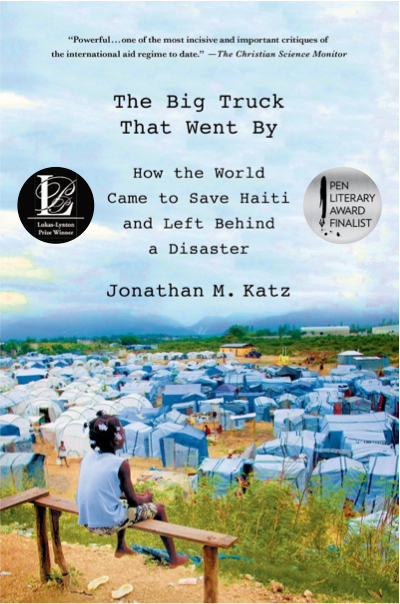

Jonathan M. Katz
Award-winning Journalist & Author


Readings &
Lecture Topics
- Gangsters of Capitalism
- The Big Truck That Went By
- Journalism in the Disaster Zone
- The Clintons’ Republic of Haiti
- What’s the Matter with the United Nations?
- A Gut Feeling: Uncovering the Source of an Epidemic
Biography
“Katz is a great storyteller who enmeshes the reader in a lively web of history, incident, and examples of humanity pushing through disaster, hard luck, iniquity, and triumph to muck it up all over again.”―J. Anthony Lukas Prize Jury
“Jonathan Katz’s strength is his unique combination of heart, history and solid reporting”― Kathie Klarreich
“Jonathan M. Katz has a passion for the truth.” —Mark Doyle, BBC correspondent
Jonathan Myerson Katz is a journalist and author whose work focuses on politics, history, conflict, and disaster. A former Associated Press foreign correspondent, his freelance work has appeared in dozens of publications including the Atlantic, Foreign Policy, Guardian, the New Republic, New York Times and New York Times Magazine, Smithsonian, and more. He also publishes a widely read newsletter, The Racket.
As AP bureau chief in Port-au-Prince, Haiti, Katz survived and provided the first international alert of the deadliest earthquake ever recorded in the Western Hemisphere. Months later, he broke the story that United Nations peacekeepers sent to provide security in the earthquake’s aftermath had caused and were covering up their role in a devastating cholera epidemic. For his work in Haiti, Katz was awarded the Medill Medal for Courage in Journalism (since renamed in honor of James Foley). Katz also covered Mexico’s drug wars, the Second Intifada in Israel and Palestine, migration crises in the Dominican Republic, hate crimes in the United States, corruption on Capitol Hill, and many other stories.
His first book, The Big Truck That Went By: How the World Came to Save Haiti and Left Behind a Disaster (St. Martin’s, 2013), was a finalist for the PEN/John Kenneth Galbraith Award for Nonfiction, and won the Overseas Press Club of America’s Cornelius Ryan Award for the year’s best book on international affairs, the J. Anthony Lukas Work-in-Progress Award, and the WOLA/Duke Award for Human Rights in Latin America. His second, Gangsters of Capitalism: Smedley Butler, the Marines, and the Making and Breaking of America’s Empire (St. Martin’s, 2022), was the product of six years of on-the-ground reporting across Latin America, China, and the Philippines, as well as extensive archival research around the world. It was a national bestseller and won a Virginia Literary Award.
Katz has appeared as a commentator on CNN, MSNBC, the BBC, NPR, Democracy Now!, and other outlets.
Short Bio
Jonathan M. Katz was the Associated Press correspondent in Haiti from 2007 to 2011. The only full-time U.S. news reporter there during the quake, he later broke the story that United Nations soldiers likely caused a post-quake cholera epidemic that killed thousands. Katz has reported from more than a dozen countries and territories. In 2011, he was awarded the Medill Medal for Courage in Journalism. Katz was a 2019 National Fellow at New America. A regular contributor to the New York Times and other publications, he regularly appears on TV and radio and formerly directed the Media & Journalism Initiative at Duke University’s John Hope Franklin Humanities Institute. His next book, Gangsters of Capitalism: Smedley Butler, the Marines, and the Making and Breaking of America’s Empire, will be published in January by St. Martin’s Press.
Visit Author WebsiteVideos
Publications
Gangsters of Capitalism: Smedley Butler, the Marines, and the Making and Breaking of America’s Empire
Nonfiction, 2021
A groundbreaking journey tracing America’s forgotten path to global power—and how its legacies shape our world today—told through the extraordinary life of a complicated Marine.
Smedley Butler was the most celebrated warfighter of his time. Bestselling books were written about him. Hollywood adored him. Wherever the flag went, “The Fighting Quaker” went—serving in nearly every major overseas conflict from the Spanish War of 1898 until the eve of World War II. From his first days as a 16-year-old recruit at the newly seized Guantánamo Bay, he blazed a path for empire: helping annex the Philippines and the land for the Panama Canal, leading troops in China (twice), and helping invade and occupy Nicaragua, Puerto Rico, Haiti, Mexico, and more. Yet in retirement, Butler turned into a warrior against war, imperialism, and big business, declaring: “I was a racketeer for capitalism.”
Award-winning author Jonathan Myerson Katz traveled across the world—from China to Guantánamo, the mountains of Haiti to the Panama Canal—and pored over the personal letters of Butler, his fellow Marines, and his Quaker family on Philadelphia’s Main Line. Along the way, Katz shows how the consequences of the Marines’ actions are still very much alive: talking politics with a Sandinista commander in Nicaragua, getting a martial arts lesson from a devotee of the Boxer Rebellion in China, and getting cast as a P.O.W. extra in a Filipino movie about their American War. Tracing a path from the first wave of U.S. overseas expansionism to the rise of fascism in the 1930s to the crises of democracy in our own time, Gangsters of Capitalism tells an urgent story about a formative era most Americans have never learned about, but that the rest of the world cannot forget.
The Big Truck That Went By: How the World Came to Save Haiti and Left Behind a Disaster
Nonfiction, 2013
“A top-notch account of Haiti’s recent history, including the January 2010 earthquake, from the only American reporter stationed in the country at the time …An eye-opening, trailblazing exposé.” ―Kirkus Reviews
Published to glowing reviews and awards, The Big Truck That Went By is a crucial, timely look at a signal failure of international aid. Jonathan M. Katz was the only full-time American news correspondent in Haiti on January 12, 2010, when the deadliest earthquake in the history of the Western Hemisphere struck the island nation. In this visceral first-hand account, Katz takes readers inside the terror of that day, the devastation visited on ordinary Haitians, and through the monumental–yet misbegotten–rescue effort that followed. More than half of American adults gave money for Haiti, part of a global response totaling $16.3 billion in pledges. But four years later the effort has foundered. Its most important promises-to rebuild safer cities, alleviate severe poverty, and strengthen Haiti to face future disasters-remain unfulfilled. How did so much generosity amount to so little? What went wrong? In what a Miami Herald Op-Ed called “the most important written work to emerge from the rubble,” Katz follows the money to uncover startling truths about how good intentions go wrong, and what can be done to make aid “smarter.” Reporting alongside Bill Clinton, Wyclef Jean, Sean Penn, and Haiti’s leaders and people, Katz creates a complex, darkly funny, and unexpected portrait of one of the world’s most fascinating countries. The Big Truck That Went By is not only a definitive account of Haiti’s earthquake, but of the world we live in today.
Winner, Overseas Press Club of America Cornelius Ryan Award
Winner, Washington Office on Latin America/Duke Human Rights Book Award
Winner, J. Anthony Lukas Work-in-Progress Award
Finalist, PEN/John Kenneth Galbraith Award for Nonfiction
Finalist, J. Anthony Lukas Book Prize
Finalist, New York Public Library Helen Bernstein Book Award for Excellence in Journalism
One of the best books of the year according to Amazon, Slate, The Christian Science Monitor & Kirkus Reviews, and a Barnes & Noble ‘Discover Great New Writers’ Book
Articles & Audio
Read What’s In Print
• Review: An imperialist repents in Gangsters of Capitalism – ABC News
• Not Every Concentration Camp is in Auschwitz by Jonathan M. Katz – Slate
• Who suffers when disasters strike? by Jonathan M. Katz – Washington Post
• What General Pershing Was Really Doing In the Philippines by Jonathan M. Katz – The Atlantic
• 4 Surrender in Toppling of Confederate Statue in North Carolina by Jonathan M. Katz – New York Times
• Protester Arrested in Toppling of Confederate Statue in Durham by Jonathan M. Katz – New York Times
• Review of The Big Truck That Went By — Boston Globe
• Review of The Big Truck That Went By — Christian Science Monitor
• Read Jonathan M. Katz’s “The Clinton’s Didn’t Screw up Haiti Alone. You Helped” – Slate
• Read Jonathan M. Katz’s “What Happened to North Carolina?” – The New York Times Magazine
• Read Jonathan M. Katz’s “In Exile” — New York Times Magazine
• Read Jonathan M. Katz’s “The Man Who Launched the GOP’s Civil War” —Politico Magazine
• Read Jonathan M. Katz’s “How Not to Report on an Earthquake” — New York Times Magazine
• Read Jonathan M. Katz’s “The Secretary General in His Labyrinth” — New Republic
• Read Jonathan M. Katz’s “The King and Queen of Haiti” — Politico Magazine
• Read Jonathan M. Katz’s “The Celebrity as Hero: When Sean Penn Fought a Phantom Epidemic” — Gawker
Listen to Audio
• Katz discusses Haiti’s complicated history with foreign aid – Marketplace
Selected Writings
Introduction
“Why Haiti?” Hillary Rodham Clinton asked in early 2010, speaking on behalf of a bewildered world. The earthquake that leveled Port-au-Prince and much of southern Haiti had defied logic, imagination, even superstition. How did a magnitude 7.0 temblor—a huge release of energy, but not necessarily catastrophic—prove to be the deadliest natural disaster ever recorded in the Western Hemisphere? Why did an earthquake, of all calamities, strike at the heart of a nation already reeling from so many others? And why, three years after so many countries and ordinary people sent money and help, hasn’t Haiti gotten better?
I wrote this book in part to answer those questions. When the earthquake struck, I had been living in Haiti for two and a half years. I had already seen a lifetime’s worth of disasters, both political and natural. Two centuries of turmoil and foreign meddling had left a Haitian state so anemic it couldn’t even count how many citizens it had. Millions were packed in and around the nation’s capital, living in poorly made buildings stacked atop a fault line. People could not rely on police, a fire department, or schools. Even the rat-infested General Hospital charged so much for basic medicine that few Haitians could afford care. Nearly everything—water, gas for generators, hungry relatives from the countryside—was delivered by truck. Each day, big eighteen-wheelers rumbled down the narrow streets, shaking homes as they passed. When the shockwave surged through Port-au-Prince, just fifteen miles from the epicenter, many of us thought at first that it was a gwo machin, a big truck, going by.
I wanted to understand how people could endure not only the catastrophe that befell Haiti on January 12, 2010, but also the hardship and absurdity that followed.


